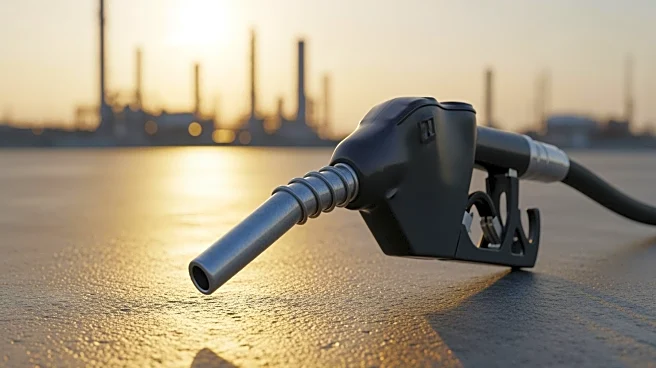What's Happening?
Libya has seen a slight increase in diesel prices, coinciding with a rise in the global average diesel price from $1.23 to $1.24 per liter. This development comes as other African countries, including Egypt, Nigeria, Tunisia, Ethiopia, and Liberia, have
experienced marginal reductions in diesel prices. Meanwhile, diesel prices in Algeria, Angola, and Sudan have remained unchanged. Madagascar has entered the list of African countries with the lowest diesel costs, replacing Gabon. The changes in diesel prices are significant as they directly impact manufacturing costs, consumer pricing, and the competitiveness of firms across the continent.
Why It's Important?
The fluctuation in diesel prices is crucial for African economies, particularly for oil-producing countries like Nigeria. The Nigerian government has implemented a 15% import levy on gasoline and diesel to protect domestic refineries, such as the Dangote Refinery, which aims to reduce reliance on imported fuels and stabilize the petroleum market. This strategy highlights the importance of energy self-sufficiency in managing fuel costs and fostering economic resilience. By investing in domestic refining capacity, African countries can reduce their dependence on imported petroleum, potentially stabilizing fuel costs and boosting economic growth.
What's Next?
As diesel prices continue to fluctuate, African countries may need to consider further investments in domestic refining capacity to achieve energy self-sufficiency. Nigeria's ongoing energy reforms serve as a model for other countries looking to stabilize fuel costs and enhance economic competitiveness. The long-term goal is to reduce and stabilize fuel costs through domestic manufacturing, minimizing reliance on imported products that often flood the market at lower prices.
Beyond the Headlines
The broader implications of diesel price changes extend beyond immediate economic impacts. Energy self-sufficiency can drive social welfare and economic progress across Africa. By reducing reliance on imported fuels, countries can develop markets where fuel prices reflect actual production costs rather than global volatility, fostering economic resilience and prosperity.















